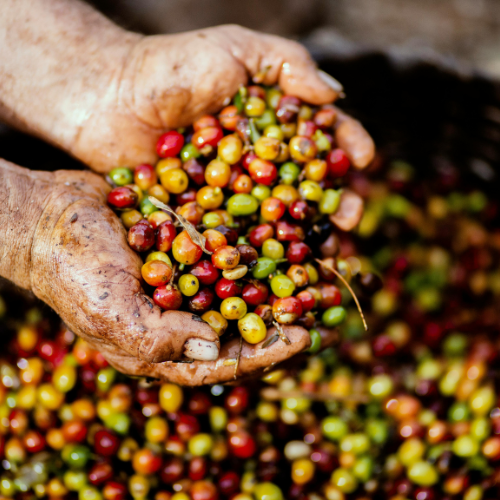The Legend of Kaldi – How Coffee Was Discovered
Centuries ago, in the Ethiopian highlands, a young goat herder named Kaldi noticed something unusual—his goats were unusually energetic after eating red cherries from a certain tree. Intrigued, Kaldi tasted the cherries himself and experienced a newfound alertness. Excited by his discovery, he brought the fruit to a nearby monastery, where monks used the beans to make a drink that helped them stay awake during long prayers. This was the birth of coffee—right in Ethiopia.
Ethiopia’s Coffee Heritage and Tradition
Ethiopia is not just the origin of coffee—it is a nation deeply connected to coffee culture. Unlike many other coffee-growing countries, Ethiopia has a rich tradition of coffee consumption that dates back centuries. Coffee is not just a drink; it is a symbol of hospitality, tradition, and social connection.
One of Ethiopia’s most cherished traditions is the Ethiopian Coffee Ceremony, a ritual that reflects the country’s deep respect for coffee. Fresh green coffee beans are hand-roasted over an open flame, ground using a mortar and pestle, and brewed in a traditional clay pot called a jebena. This slow, deliberate process is a sign of respect and togetherness, bringing family and friends together over multiple rounds of coffee.
Why Ethiopian Coffee Stands Out
Ethiopian coffee is world-renowned for its rich flavors, diverse varieties, and high-altitude cultivation. Unlike other coffee-producing regions, Ethiopia is home to thousands of heirloom coffee varieties, giving its coffee an unmatched complexity in taste.
Key Factors That Make Ethiopian Coffee Unique:
✅ Diverse Coffee Regions – Ethiopia’s coffee-growing areas, including Yirgacheffe, Sidamo, Guji, and Harrar, each produce distinct flavors, from floral and citrusy to bold and wine-like.
✅ High-Altitude Grown – Ethiopian coffee thrives in elevations of 1,500 to 2,200 meters, allowing slow bean maturation for richer flavors.
✅ Traditional Processing Methods – Ethiopia uses both washed (wet) and natural (sun-dried) processing, enhancing different flavor profiles.
✅ Sustainable & Organic Farming – Most Ethiopian coffee is grown without chemicals, making it naturally organic and environmentally friendly.
Ethiopia’s Global Coffee Impact
Today, Ethiopia is one of the world’s top coffee exporters, supplying both specialty and commercial coffee to roasters, distributors, and coffee lovers worldwide. Ethiopian coffee has influenced global coffee culture, inspiring third-wave coffee movements and specialty coffee roasters to seek out high-quality, traceable beans.
Despite its global popularity, coffee remains deeply Ethiopian. Over 50% of the coffee produced in Ethiopia is consumed locally, reinforcing the country's strong bond with its national drink.

